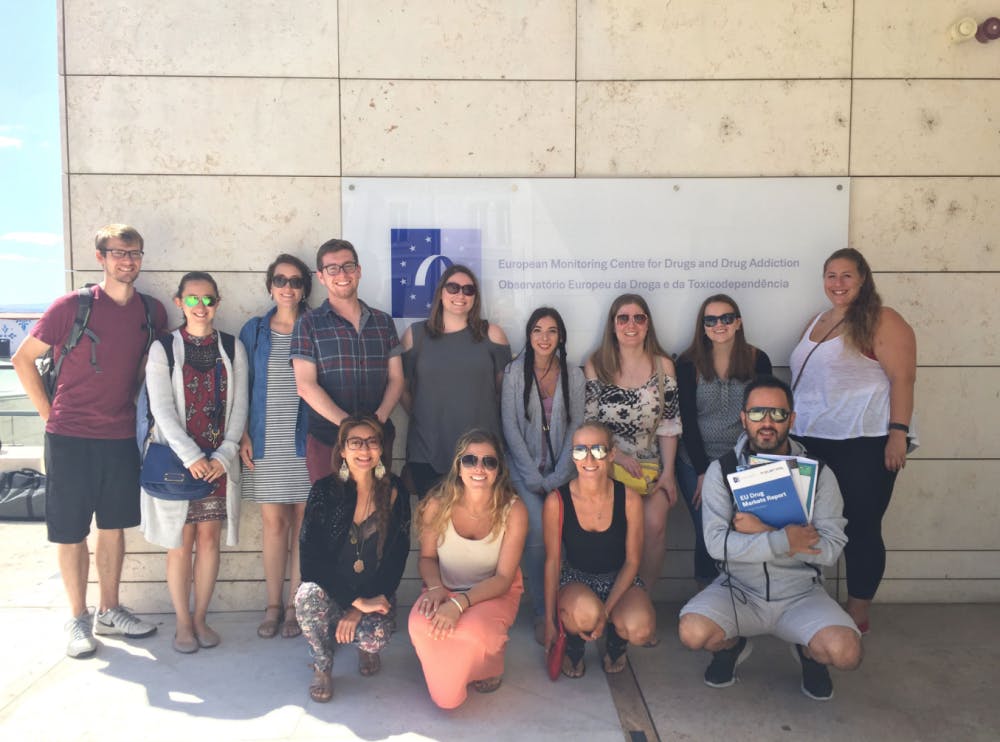By Jennifer Goetz
Staff Writer
Graduate and undergraduate students at the College had the opportunity to travel to Lisbon, Portugal this summer to learn about counseling and drug addiction.
Courses offered included “Substance Abuse and Addiction: Individual, Family, and Society,” and “Treating Addiction & Co-Occuring Disorders.”
This was the fourth year graduate students at the College had the chance to visit Portugal while learning about drugs and addiction, and the first for undergraduate students.
Class sessions lasted seven or eight days and took place at St. Julian’s, an international school located in Carcavelos.
Being a short distance from Lisbon and the beach allowed students to enjoy weekends exploring away from the classroom.
Luke Thompson, a graduate student studying school counseling, expressed why the class was important to him.

“I wanted to take a course related to substance abuse because it is such a salient subject in the school setting,” Thompson said.
International students who also partook in the study abroad trip brought different perspectives to the group.
“I learned along both my on-site peers as well as international students from Mexico, Taiwan and China, who all share their own perspectives,” Thompson said.
Through coursework and various field trips around Portugal, students were able to learn how drug policies in other countries differ from the U.S.
“We really get a global perspective when we take the course in Portugal,” said Sandy Gibson, an associate professor of counselor education and faculty leader of the trip.
According to Gibson, the U.S. is the only country that allows pharmaceutical companies to market to the public, allowing Americans to access more prescription medication than needed.
In addition, the U.S. also has the largest incarceration rates. Many prisons in the U.S. are privatized and can give donations to politicians to make sure that the prison system continues running.
“We are taught really negative things about people who use drugs,” Gibson said.
There is negative stigma surrounding drug users because Americans are unaware of the circumstances behind drug use, and there is a lack of understanding in the U.S. about the origins of addiction, according to Gibson.
This situation, almost anywhere else, is very different. In Portugal, Law 30/2000 was enacted in 2001 to decriminalize drug use.
Prior to 2001, drug use in Portugal was “considered a criminal offense punishable with imprisonment up to three months or a fine,” according to the European Monitoring Centre for Drugs and Drug Addiction.
Since 2001, if police catch someone with a modest amount of an illegal substance, and that person is not suspected of having any other offences, they will be redirected to a commission.
Comprised of a lawyer, doctor and social assistant, the commission offers treatment and aid, however it will not force an individual to accept help.
This policy has its limits— if a person has a “greater than personal amount” of drugs in his or her possession, more severe actions will be taken.
Portugal’s approach to looking at drug abuse has served as a model for other countries, making it a perfect place for students to witness how a government functions with a policy that decriminalizes drug use, according to Thompson.
“The site visits helped illustrate Portugal’s values related to addiction: that it is a public health concern, and not a criminal justice one,” Thompson said.
Studying abroad in Portugal has allowed ample opportunity for students to expand what they’ve learned in the classroom and apply it to real life scenarios.
“I love seeing (students’) perspectives change,” Gibson said. “Students have a new mindset when it comes to drug addiction, and are quicker to sympathize than to judge. Classes like (this one) help students take a look at addiction from a new perspective.”







